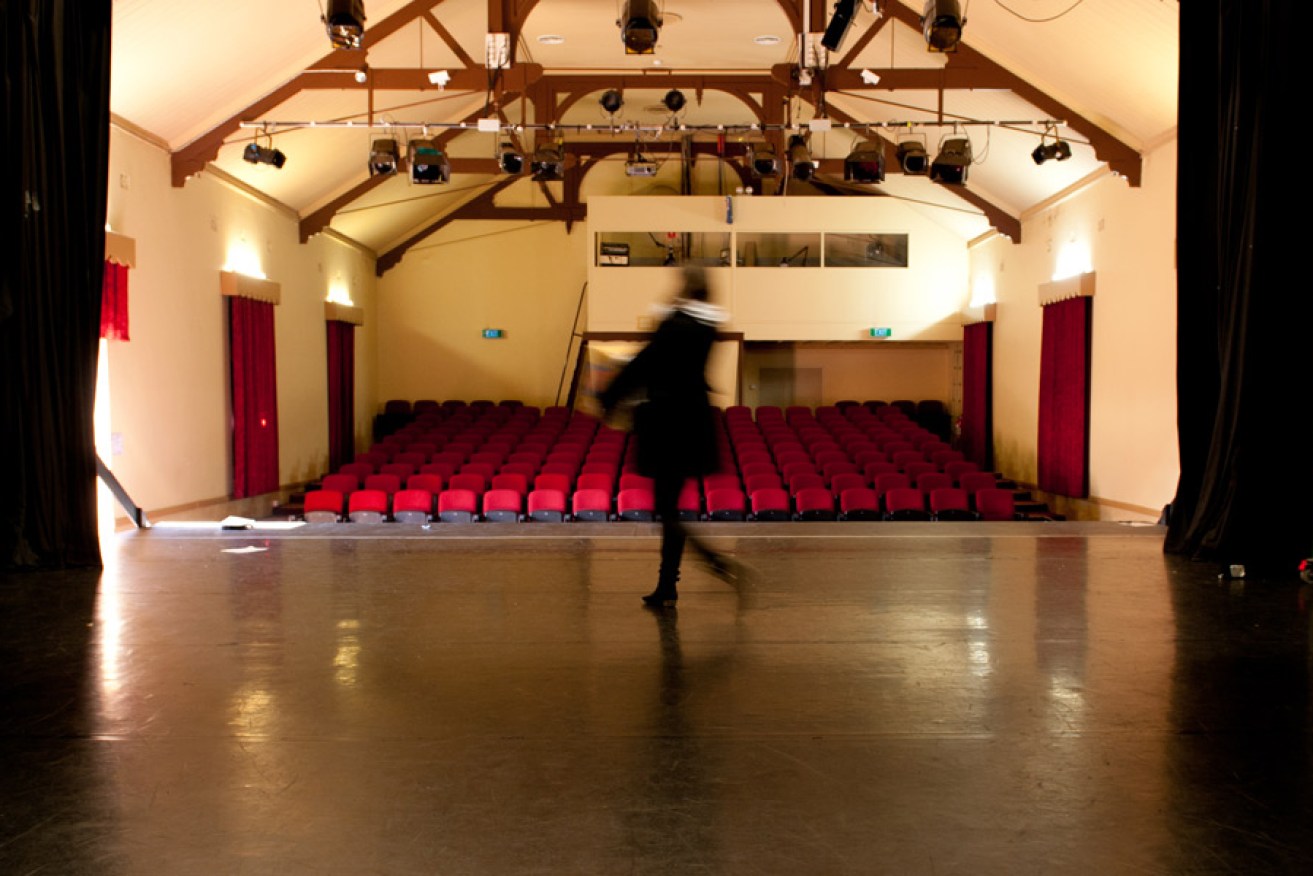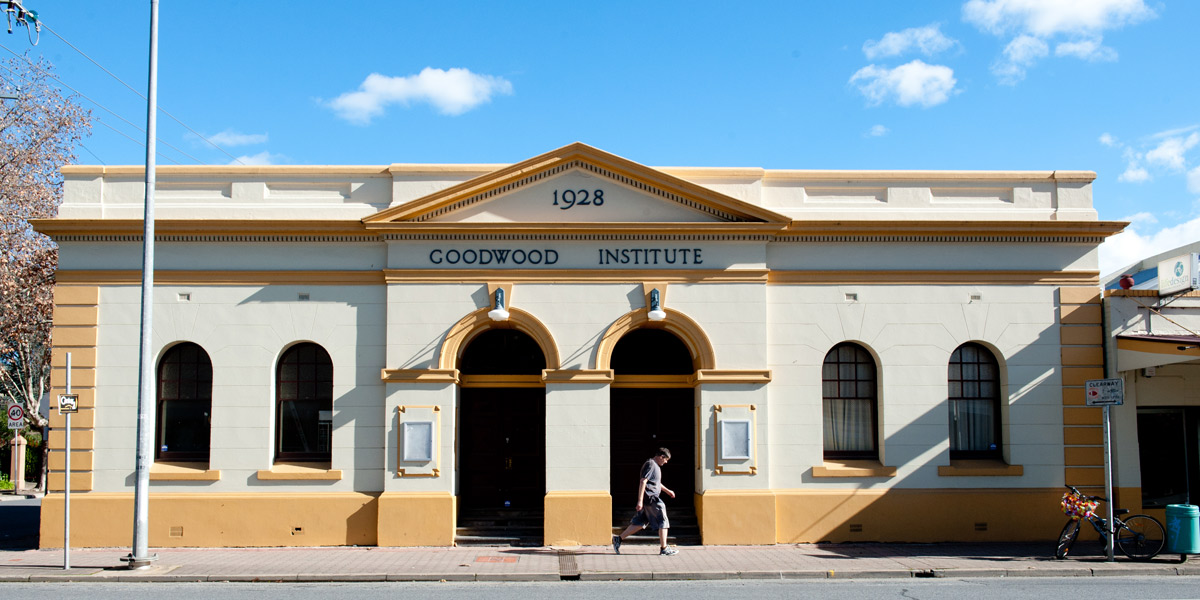Mourning the likely loss of Urban Myth

Urban Myth moved into the Goodwood Institute in 2012. Photo: Nat Rogers / InDaily
The likely closure of Urban Myth has rocked current and former members of the long-running Adelaide youth theatre company.
After 34 years of operation – in which it has had more than 10,500 active participants and produced more than 160 plays – the company announced at the weekend that it would hold a meeting of members next month to appoint liquidators.
The organisation’s board says the only hope now lies with the possibility of last-minute financial help from government. An independent financial review is also currently being conducted by the Carclew youth arts umbrella organisation, through which the State Government provides Urban Myth with annual funding of around $97,000.
Meanwhile, some supporters are organising petitions, writing to ministers and trying to co-ordinate a flashmob at Parliament House. Others have voiced their disappointment and sadness on social media.
“When I was 10 I suffered from terrible depression and social anxiety,” wrote former participant Tom Christopherson, who has since established a career in the performing arts.
“After my parents split up I wasn’t coping at school and my mental health was a mess. It was suggested that I start attending drama classes at Urban Myth … I went to an impro camp, I won an award, I had found ‘my people’ …
“Urban Myth gave me my roots, a voice, a place to belong and a place to make.”
Current member Olivia Fairweather said she was an “anxious, sad 13-year-old with low self-esteem” who was being bullied as school when she got involved in her first production with the company. In her Facebook comment, she credits Urban Myth and director Glenn Hayden with building her confidence and helping her find a new network of friends and mentors.
The theatre company seeks to help young people aged seven to 27 develop artistic and personal skills through workshops, classes and performances.
An average of three to five Urban Myth students each year have gone on to national drama schools such as NIDA. One of its most famous graduates is actor Hugh Sheridan, while other less-well-known former participants work in the industry as actors, directors, technicians or arts administrators.
However, it’s not just about careers. Board chairperson Paulette Kolarz says the company’s focus is on developing young people’s interpersonal and leadership skills, encouraging creative expression and networking opportunities, and showcasing relevant social issues.
“It provides that vehicle for kids who may not necessarily fit into some of the things that are set up for them in schools and the community to express themselves.”
The recent production of Romeo and Juliet, which finished on the weekend, was the last show for artistic director Hayden – and possibly the final curtain call for the company itself.
Kolarz told InDaily that at this stage the three paid staff would be employed for just two more weeks and, while arrangements have been made to continue term-three workshops, there will be no program in term four.
The members’ meeting to voluntarily wind up the company is scheduled for September 15, but approaches for urgent financial assistance have been made to federal, state and local government, including to the South Australian Minister for Youth Zoe Bettison and Minister for the Arts Jack Snelling.
“It’s a really difficult and challenging environment,” Kolarz said, adding that a significant number of youth theatre companies nationally were closing down due to funding pressures.
“It’s a tough environment for all businesses at the moment, and it’s particularly difficult for the not-for-profits.”
A spokeswoman for Minister Snelling told InDaily that Carclew, through the State Government, had funded Urban Myth “for many years”.
“In 2012 Urban Myth moved to the Goodwood Institute and a new business model was put in place,” the spokewoman said.
“At this time the State Government, through Arts SA, provided Urban Myth with additional financial assistance. Since then, the company has encountered financial problems.
“An independent financial review has been commissioned by Carclew – with Urban Myth’s co-operation. When the review has been finalised, Carclew and Arts SA will meet with the company to identify next steps.”
Carclew said results from the independent review, which was being conducted as part of a confidential grant application and assessment process, were expected “within the coming weeks”.
“Urban Myth have been a leading youth performing arts company in South Australia and have been supported by Carclew’s funding programs for many years,” said Carclew chief executive Tricia Walton.
“The Carclew Board is saddened to see this outcome for Urban Myth and will act to ensure the funds remain invested in high-quality youth arts activity in South Australia.”
Urban Myth Theatre Company suffered a major blow in 2011 when the Australia Council cut its triennial funding. The loss of that guaranteed money – which accounted for 63 per cent of its total annual funding – also affected its ability to plan strategically, Kolarz said.
The following year, when the lease of the Unley cottage from which it operated expired, the company moved to the historic Goodwood Institute on Goodwood Road. At the time, Hayden had high hopes for the future, telling InDaily the larger premises would enable Urban Myth to tackle bigger projects and also to generate an income stream by renting out the 212-seat theatre, rehearsal studios and function facilities.
However, issues surrounding heritage restrictions on the 125-year-old institute, liquor licensing, workplace health and safety, and other operational factors meant it took too long to generate revenue.
In addition, Kolarz said, Urban Myth had been unable to secure any grants in the past two years.
While it has traditionally been able to rely on getting between $50,000 and $300,000 in grant funding annually, Kolarz said there was increasing competition among not-for-profit organisations for a shrinking pool of money. In one instance, a grant that used to attract around 12 applications was now receiving more than 1100.
“That has been a significant impact on us; where we would normally be able to quite confidently receive this money, we haven’t been able to get anything.”
The fact that the company is based in Goodwood, even though it draws participants from further afield, may be a factor.
“Where we are based is seen as privileged and our members are seen as that … but that doesn’t mean our members are less important,” Kolarz said.
“If we were north or south, I suspect there would be additional funding available.
“[But] Bullying on social media, isolation and depression are not unique to the north and south – it’s a massive issue for our young people.”
Even if the theatre company was able to win a late reprieve from closure, Kolarz said it would still have to move out of the Goodwood Institute. Any future model would have to be focussed mainly on community workshops, with smaller productions.
“Urban Myth offered tools for articulating the world around us, at an age when that world feels most limitless, and also most daunting”
While some may question, in hindsight, whether the move to the Goodwood Institute was the right one, the Kolarz said Urban Myth could have closed down three years ago had it not tried to replace its reliance on government funding with an alternative revenue stream.
“We just kind of had bad luck after bad luck.
“This is not a blame game – I want to use it as a chance to celebrate some of the wonderful things that have happened over the past 30 years.
“We were grateful for the triennial funding we had over so many years … it’s not about pointing fingers but trying to raise awareness of how important support for youth and youth arts is.”
Award-winning playwright Finegan Kruckemeyer, a former member who has since had 52 commissioned plays performed on five continents, credits joining Urban Myth as his “biggest and most formative step”.
“More than anything … Urban Myth offered tools for articulating the world around us, at an age when that world feels most limitless, and also most daunting. It told us we could be brave with our ideas, and so we were.”





